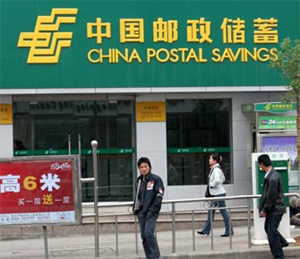China’s Postal Savings Bank to Play Key Role in Spreading Rural Wealth
 Feb. 26 – China’s Postal Savings Bank, a relatively obscure yet powerful entity formed in 2007, will be the main infrastructure driver for getting income into rural areas under the country’s economic stimulus plan.
Feb. 26 – China’s Postal Savings Bank, a relatively obscure yet powerful entity formed in 2007, will be the main infrastructure driver for getting income into rural areas under the country’s economic stimulus plan.
The bank, which was initially capitalized at RMB20 billion, was formed following a restructuring of the State Post Bureau, and consequently possesses some 37,000 branches nationally thanks to its link with China’s postal service. It is now the country’s second largest lender in terms of outlets after the Agricultural Bank of China. In terms of deposits, the bank holds over RMB1.5billion, making it the fifth biggest in assets.
As the economic credit crunch hits China, the government is keen to spread its economic stimulus plan specifically to rural areas, and has targeted improvements in the countryside as key to the national development. The fixed commodity prices the government pays to farmers have been increased, while at the same time, farmers are also being encouraged to upgrade agricultural equipment by being offered discounts of up to 30 percent of the sale price on specific products, thereby both encouraging spending, improving agricultural efficiency and raising income levels.
The average per capita income in rural areas is about RMB2,760, about a third of the average in urban areas, while borrowings by the same group averaged RMB5,000, less than 10 percent of urban dwellers. The bank is also engaged with assisting China’s credit cooperatives, which themselves are currently being evaluated for suitability for potential microfinance schemes. Such schemes, which have proven remarkably successful in Bangladesh and India, have caught the attention of China and the World Bank is currently advising on a suitable model for China’s rural areas. With its extremely broad reach, the China Postal Savings Bank is likely to play a key role in such initiatives.
- Previous Article China Industry: Feb. 26
- Next Article Guangzhou Extends Aid for Migrant Workers





























